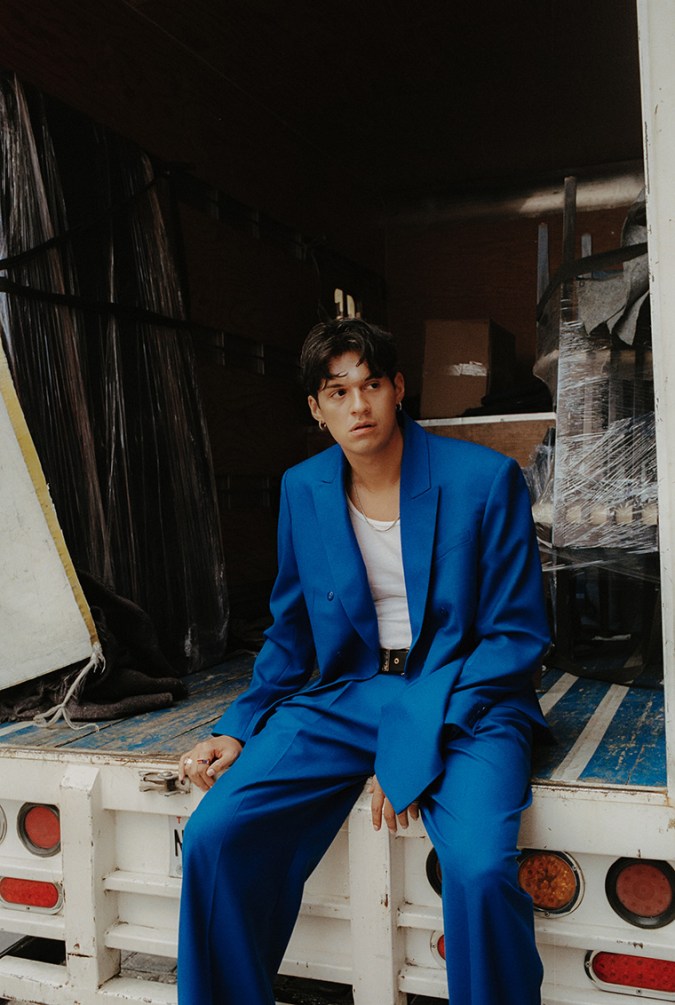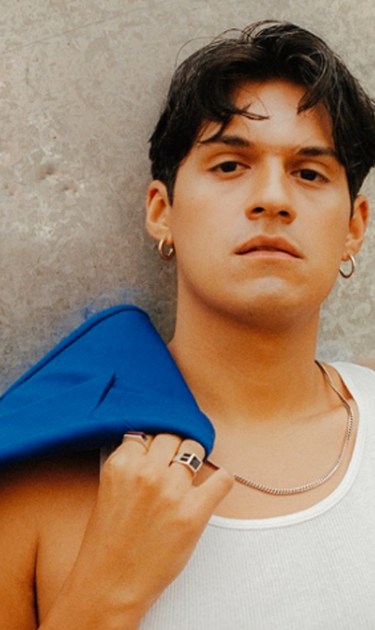Starting over from scratch can be a dangerous and time-consuming feat. For Omar Apollo’s debut album Ivory, the opportunity became both the project and the artist’s saving grace. Representing a bloomed and self-assured state of creative control, the eclectically ambitious 16-track, bilingual catalog plays through like an aqueous body of work riding the waves of fluidity, all while remaining enveloped in the oceans of his branded alt-R&B, emotional depth, and inimitable falsetto vocals. Apollo is not dipping his toes in experimentation on Ivory. He’s instead approaching this next chapter of his career showcasing his musical mastery and total creative submersion defined on his own terms. Listeners are taken on a joyride through the many fragmented pieces that make up his effortlessly cool demeanor, relatable artistry, and enigmatic creative vision to present his most fully-realized project to date.
Sitting on the verge of global superstardom with his latest, it seems almost counterintuitive to learn that the original album’s creative process saw months of collaborative work completely halted and scorched back to zero just days before production for the rollout began. In an interview with Apple’s Zane Lowe, Apollo now openly shares that most of the initial demos were voided at the very last minute, attributed to too much compromise as a result of having too many cooks in the kitchen and his perfectionist mentality that wanted to ensure his album represented the best effort he could produce. Ultimately, for the 24-year-old sensation, the work in progress began to palpably lack the soul he was hoping the album would embody — also, the underwhelming response when thoughts of performing them left him no option but to start again. With reinvigorated trust in his own vision and a newly cultured sense of creative boundaries, Apollo cultivated Ivory to its final fruition within a timeline of the ensuing three months.
Setting the album’s tone right off the bat, the title track “Ivory” comes in just under a minute with harmonized voices that infiltrate like an ethereal calling upon the intimacy of a strong, connective bond between two entities whose relationship is left undefined. This open-for-interpretation dynamic carries through the rest of the album, which delivers open-diary intellective, sexual, and emotional reflections on the kaleidoscopic complexities of love, longing, and self-realization.
“Killing Me” provides an incredibly sultry moment that leans into the lure of physical pleasure and sexual desire with one of the more memorable lyrics, “Love me like I’m gonna die/Fuck me like you fantasize,” while “Bad Life” featuring BFF Kali Uchis presents a similar sonic structure yet explores the contrasting view of seeking a deeper emotional connection beyond an existing physical one. A broader narration of unrequited, queer love found its place on the tracklist with the beautifully crafted “Invincible,” which features Daniel Caesar and presents a world of complex synth beats laced with traces of ‘90s drum n’ bass.

A broader narration of unrequited, queer love found its place on the tracklist with the beautifully crafted “Invincible”
Apollo explores the changing of his internal world on “Petrified” as he guardedly belts, “And I believe in what I fеar/Lately I’ve been able to see more clear.” He then moves towards revelation as he observes his changing outer world on “Personally,” and helplessly croons, “Cause I really don’t wanna be here alone/Too many people I don’t see no more/Too many feelings I don’t feel no more.” The leading single “Go Away” provides a dynamic funk-leaning groove track that features his signature falsetto as unreturned pleas of “I just don’t see you enough” eventually turn into a final goodbye.
Providing a surprising sonic contrast is “Talk.” This track finds itself somewhere between indie-pop and alt-rock, featuring an eccentric guitar breakdown that can only be described as a heavily-influenced product of his blossomed friendship with The Strokes guitarist, Albert Hammond Jr. (who lent his talents on track “Useless” on Apollo’s prior project). “Evergreen” finds a moment to slow dance in the feelings of restless unrequited love under the moonlight of soulful Motown composition. “Mr. Neighbor” provides a relaxed moment of textured vocals reminiscent of early Frank Ocean and Prince productions, which have earned him the all-too-often comparison nods.

Pulling a similar moment to his heritage-inspired corrido “219” on Apolonio, Apollo introduces “En El Olvido,” a standout moment for Latine listeners raised on the sounds of emotionally charged rancheras à la Chente. Stripping down the typically boisterous sound to an acoustic guitar-driven ballad, the emotional intensity is not lost as he vehemently solicits an exit from the memories of a past lover through the only fully Spanish-language track on the album. Providing another nod to his culture is his latest, and definitively one of the more playful singles, “Tamagotchi.” Produced by none other than The Neptunes, the track has its trademark 4-count start, which had fans like Tyler, The Creator publicly raving over its banger status by sliding into Apollo’s Instagram DMs.

Like ivory in the natural world, the album presents itself as a foundationally cohesive element from which each track transfigures into its own carved-out work of art that appreciates the album’s gilded value. Omar Apollo’s debut marks a vibrantly compelling (re)introduction that is prismatic, queer, and alluringly amorphous. Ivory isn’t paving the way for him to claim his title as a superstar; it’s simply exhibiting a refined curation of all the qualities that prove he’s already been one all along.
Listen to Omar Apollo’s Ivory below.




